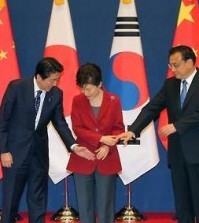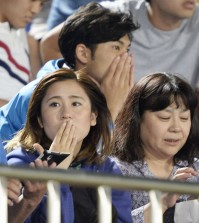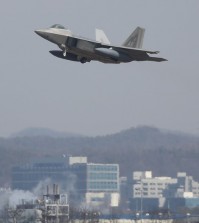- California Assembly OKs highest minimum wage in nation
- S. Korea unveils first graphic cigarette warnings
- US joins with South Korea, Japan in bid to deter North Korea
- LPGA golfer Chun In-gee finally back in action
- S. Korea won’t be top seed in final World Cup qualification round
- US men’s soccer misses 2nd straight Olympics
- US back on track in qualifying with 4-0 win over Guatemala
- High-intensity workout injuries spawn cottage industry
- CDC expands range of Zika mosquitoes into parts of Northeast
- Who knew? ‘The Walking Dead’ is helping families connect
Calls grow in US for Abe to apologize for wartime history
WASHINGTON (Yonhap) — Calls are growing in the United States for Japanese Prime Minister Shinzo Abe to apologize for the country’s wartime history as his trip to Washington draws closer amid growing signs the nationalist leader is unlikely to issue a new apology.
Abe is scheduled to make a weeklong visit to the U.S. next week amid calls for him to use the visit, which includes an address at a joint meeting of Congress, to offer a sincere apology for Japan’s wartime atrocities and mend fences with neighboring nations.
“The success of the visit also depends on whether and how honestly Mr. Abe confronts Japan’s wartime history, including its decision to wage war, its brutal occupation of China and Korea, its atrocities and its enslavement of thousands of women forced to work as sex slaves or ‘comfort women’ in wartime brothels,” the New York Times said in an editorial published Monday.
It is “the fault of Mr. Abe and his right-wing political allies” that history tensions have not been settled yet, the editorial said, accusing them of “questioning history and even trying to rewrite it, stoking regional tensions.”
“Mr. Abe may have more to say on all this on Aug. 15, the actual date of the surrender. But his remarks to Congress will send an important signal,” it said.
Abe plans to issue a statement on Aug. 15 to mark the 70th anniversary of the end of World War II. Abe has said he would include in the statement Japan’s remorse over the war and how the country will contribute to the region and beyond.
But on Monday, Abe said he sees no need for the upcoming statement to repeat previous statements of apology the country has issued, strongly suggesting that the planned statement is unlikely to include an apology for Japan’s wartime history.
“Now that I’ve said I’ll succeed them, we don’t need to write them again,” Abe was quoted as saying on Japan’s Fuji television in response to a question whether the August statement would include such expressions as aggression and apology.
The New York Times noted that even though Abe has expressed remorse and said he would honor Japan’s past apologies, he has “added vague qualifiers to his comments, creating suspicions that he doesn’t take the apologies seriously and will try to water them down.”
The paper also accused Japan of trying to whitewash wartime history, pointing out the Japanese education ministry’s efforts to force textbook publishers to recast descriptions of historical events to conform to the government’s “official, less forthright analysis.”
Though Abe hopes to establish Japan as a 21st-century leader that can help the U.S. counter China in Asia and take on other global responsibilities, Japan “cannot credibly fill that broader role if it seeks to repudiate criticism of its past,” the paper said.
Also Monday, the Washington Post carried an interview with former Japanese Prime Minister Tomiichi Murayama, in which the former leader, who issued the landmark 1995 “Murayama Statement” of apology for Japan’s wartime aggression, criticized Abe for roiling relations with neighboring nations.
“China and Korea accepted my statement and things were going peacefully, but now that Mr. Abe has stirred things up again, all eyes are back on this issue,” Murayama was quoted as saying.
He also expressed concerns that Abe could try to water down the 1995 statement by focusing on its references to Japan’s peace and prosperity and overlooking its references to the country’s pre-war “mistaken national policy,” according to the paper.
“Some of them say, ‘That’s something European countries did to Asian countries in the past as well, so why only Japan to be blamed?’?” Murayama was quoted as saying, referring to the sexual slavery issue. “That’s just like saying, ‘Someone stole something so what’s wrong with me stealing, too?’ It doesn’t work like that.”
PoliticusUSA, a U.S. news outlets on political news, accused the Japanese leader of acting “like a man who knows he has to say sorry, and publicly must actually be sorry, but who privately thinks facts are an inconvenience,” such as the country’s use of women as sex slaves.
Abe must use his speech before Congress to “show sincere repentance for the past,” it said.
On Sunday, Eamonn Fingleton, a columnist on East Asia issues, said in an article carried by Forbes magazine that Abe does not deserve the honor of addressing a joint session of Congress because of his handling of historical issues.
“Abe has at times conducted an almost sadistic exercise in double talk. Sometimes he seems to acknowledge the extent of the atrocities and to be duly regretful. At other times he seems to want to ‘unapologize’ — to take back, at least in part, previous leaders’ apologies,” the columnist said.

















Pingback: LA Korean American orgs to greet Japanese PM Abe with silent protest – The Korea Times
kelly
November 24, 2017 at 10:50 AM
Very nice and always successful.
This is a very good article.
I’m waiting for you the other article.
togel online